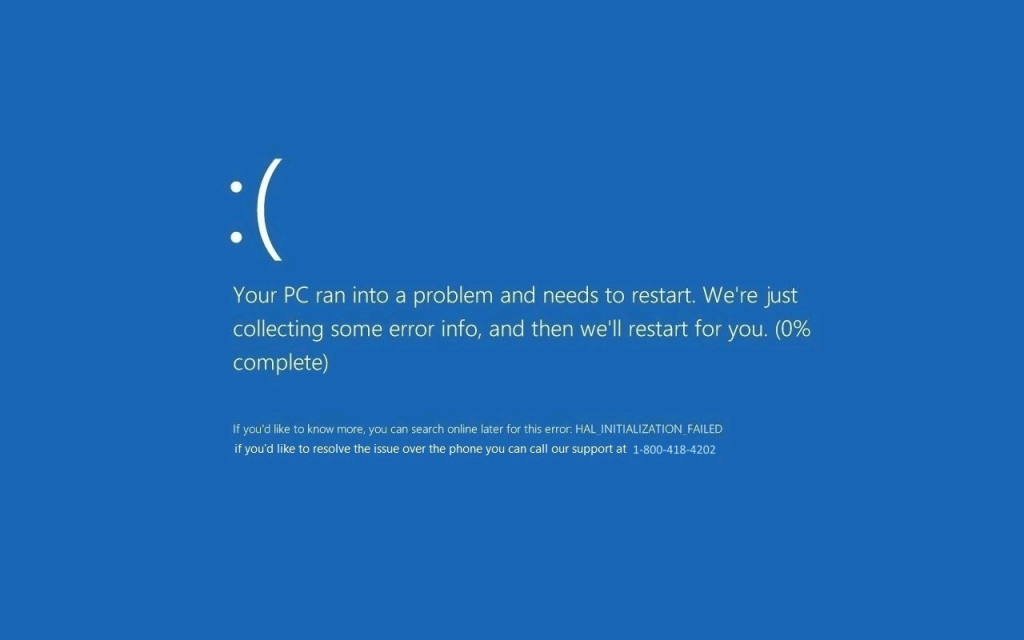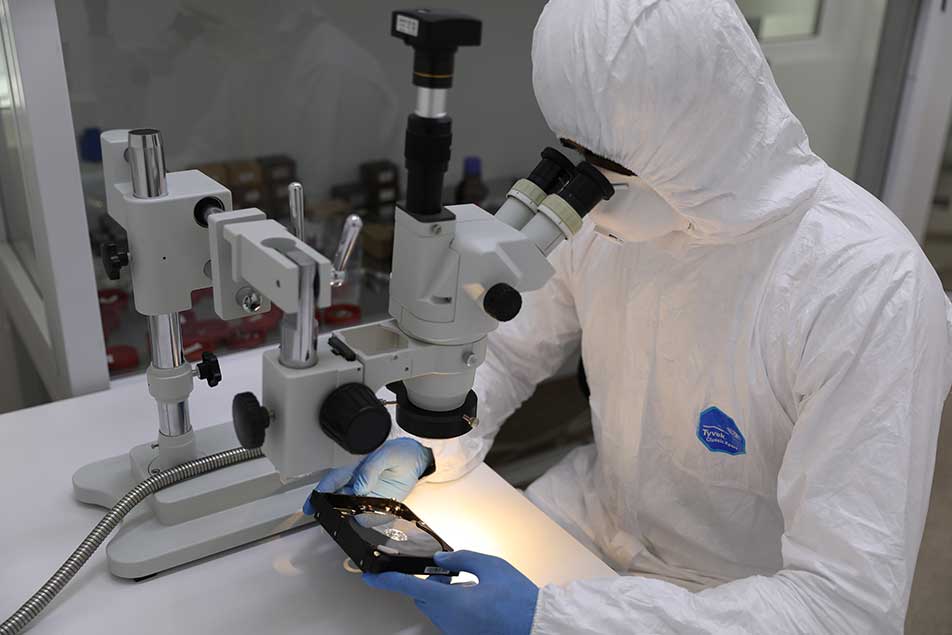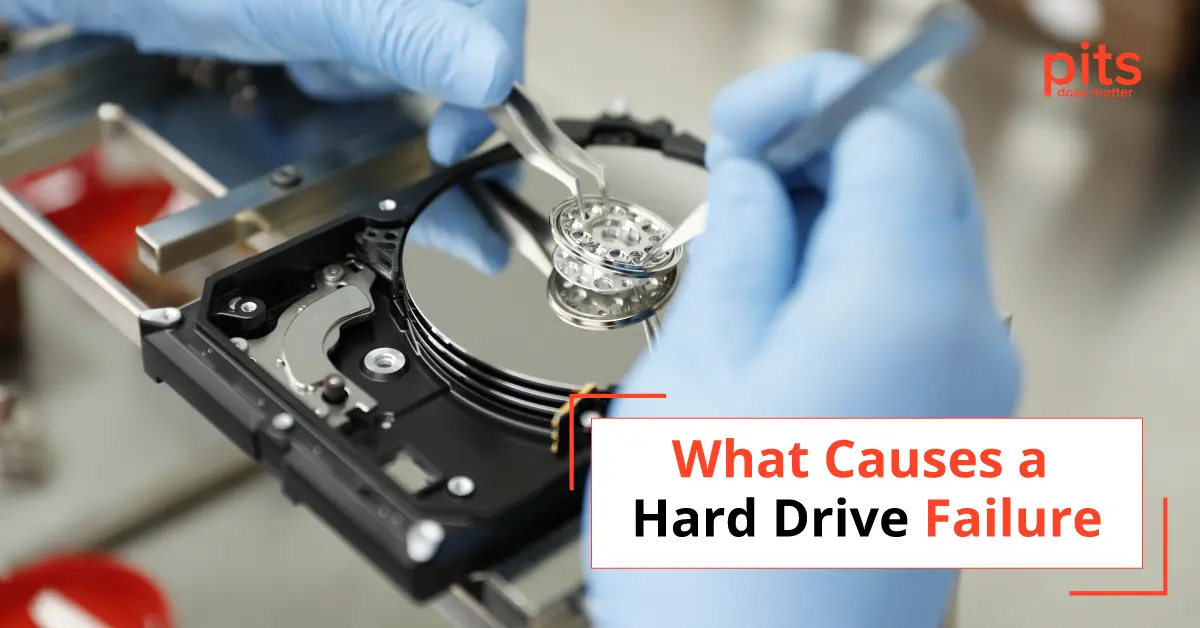What causes hard drive failure often varies, but common reasons include mechanical issues, like wear and tear on the physical components or software problems, such as malware or viruses. Other potential culprits could be power surges, heat damage, or even human error, like accidental drops or spills. Unfortunately, hard drives are not immune to failure, and several factors can cause a hard drive to fail. In this blog, our team will explore the symptoms of hard drive failure, the types of hard drive failure, and the common causes.
Symptoms of Hard Drive Failure
There are several symptoms of hard drive failure, and being aware of these symptoms can help you take proactive measures to prevent data loss. Here are some of the most common symptoms of hard drive failure:
- Frequent Crashing. If your computer system frequently crashes or freezes, it could indicate a hard drive failure. This is because the hard drive is responsible for storing all the data, including the operating system, and any corruption or damage to the hard drive can cause the system to crash.
- Slow Performance. If your computer system takes longer than usual to boot up or open programs, it could indicate a failing hard drive. This is because the hard drive is responsible for reading and writing data; any damage can slow down the system’s performance.

- Blue Screen of Death (BSOD). A blue screen of death is an error screen displayed on a Windows operating system when a critical system error occurs. One of the most common causes of BSOD is drive failure.
- Clicking or Grinding Sounds. If you hear unusual clicking or grinding sounds from your computer, it could indicate a failing hard drive.
- Missing Files or Data Corruption. It could indicate drive failure if you notice missing files or data corruption. This is because the hard drive is responsible for storing all the data, and any damage or corrosion to the hard drive can cause data loss or corruption.
Types of Hard Drive Failure
Logical Failure
A logical failure occurs when there is damage to the file system or partition table on the hard drive. Software errors, virus attacks, or user errors can cause this. Symptoms of a logical failure include missing files, corrupted files, or an inability to access the hard drive.
Physical Failure
Physical damage occurs when the hard drive's physical components are damaged. It can be caused by wear and tear, physical shock, or overheating. Symptoms include unusual sounds, an inability to access the drive, or the computer not recognizing it.
Computer Hard Drive Failure Causes
There are several common causes of hard drive failure, and being aware of these causes can help you take proactive measures to prevent hard disk failure.
Natural Wear and Tear
Like any mechanical component, hard drives have a limited lifespan. Over time, the hard drive's components can wear out.
Physical Failure
Hard drives are delicate components, and physical shock or impact can cause damage to the parts of the hard drive.
Exposure to Moisture
Hard drives are sensitive to moisture, and water damage can affect the components of the hard drive. When exposing the drive to water damage, get in touch with professionals.
Power Surges
Power surges can cause damage to the components of the hard drive. This can be caused by lightning strikes, power outages, or faulty electrical systems.
Virus Attacks
Viruses and malware can cause damage to the file system or partition table on the hard drive. This is considered one of the frequent HDD failures reasons.
User Error
User error can cause damage to the file system or partition table on the hard drive. The accidental deletion of files or formatting of the wrong device can cause this.
Preventing Hard Drive Failure
- Regularly Back Up Your Data. Regularly backing up your data is one of the most important things you can do to prevent data loss due to hard drive failure. This can be done using external hard drives, cloud storage, or other backup methods.
- Keep Your Computer Cool. Keeping your computer cool can help prevent hard drive failure due to overheating. Ensure your computer has adequate ventilation, and the cooling system functions properly.
- Protect Your Computer from Power Surges. Protecting your computer from power surges can help prevent hard drive failure. This can be done using surge protectors or uninterruptible power supply (UPS) systems.
- Use Antivirus and Antimalware Software. Antivirus and antimalware software can help prevent hard drive failure due to virus attacks.
- Avoid Physical Shock or Impact. Avoiding physical shock or impact can help prevent hard drive failure. Ensure your computer is placed on a stable surface and not moved while operating.
- Handle Your Hard Drive with Care. Handling your hard drive with care can help prevent hard drive failure. Avoid mishandling or dropping it, and ensure that it is stored in a safe place.
Data Recovery for a Failed Hard Drive with PITS
PITS Global Data Recovery Services is a leading provider of data recovery services for failed hard drives. With over a decade of experience in the industry, PITS has a proven track record of successfully recovering data from failed hard drives for clients in various sectors. The company offers a wide range of professional data recovery services for different hard drives, including desktop, laptop, external, and RAID systems.

Our skilled technicians use state-of-the-art tools and techniques to recover data from failed hard drives. PITS Global Data Recovery Services has a highly trained and experienced team of technicians capable of recovering data from various hard drives using state-of-the-art tools and techniques. The company has a success rate of over 99% for recovering data from failed hard drives. Our data recovery process is straightforward. Here are the steps involved in their data recovery process:
Risk-free Evaluation
PITS provides a risk-free evaluation of the failed hard drive to determine the extent of the damage and the possibility of data recovery.
Quote and Approval
After evaluating the failed hard drive, PITS provides a quote for the data recovery service. Once the quote is approved, the data recovery process begins.
Data Recovery
Our team of technicians uses specialized tools, advanced techniques, and ISO-Certified Class 10 Cleanroom to recover data from the failed hard drive successfully.
Data Verification and Delivery
After the data recovery process is complete, a client should verify the recovered data to ensure its integrity. The recovered data is then delivered to the client in the format requested.
Our data recovery company has a customer-focused approach, aiming to provide our clients with a stress-free data recovery experience. PITS Global Data Recovery Services is a leading provider of data recovery services for failed hard drives. The company offers a wide range of data recovery services for different hard drives, including desktop hard drives, laptop hard drives, external hard drives, and RAID systems. Our highly trained and experienced technicians use state-of-the-art methods to recover lost data from failed hard disk drives.
If you are facing a malfunction on your hard disk drive (HDD), do not hesitate to contact our customer service. Explaining all the failure symptoms to our team will help make the process easier. Contact our team today, and we will help you however we can.
Frequently Asked Questions
What are the common reasons for hard drive failure?
Hard drive failure can be caused by different factors, including physical damage, overheating, power surges, manufacturing defects, and wear over time. Software corruption and malicious programs like viruses can also cause hard drive failure.
How does physical damage lead to hard drive failure?
Physical damage like dropping or bumping can cause mechanical components of the hard drive to malfunction. This includes damage to the Read/Write head, which is critical for accessing data and leads to hard drive failure.
Can overheating cause hard drive failure?
Overheating can cause hard drive failure. If a hard drive gets too hot, it can lead to component malfunction and eventual drive failure. Therefore, keeping your system cool is important to prevent such issues.
Do power surges lead to hard drive failure?
Power surges can indeed cause hard drive failure. Unexpected increases in power can damage the electronic components of the hard drive.
How can software issues cause hard drive failure?
Software issues such as system crashes, improper shutdowns, and malicious software can cause hard drive failure. These can lead to the corruption of system files necessary for the hard drive operation. Regular system checks and using reliable security software can help prevent such issues.
